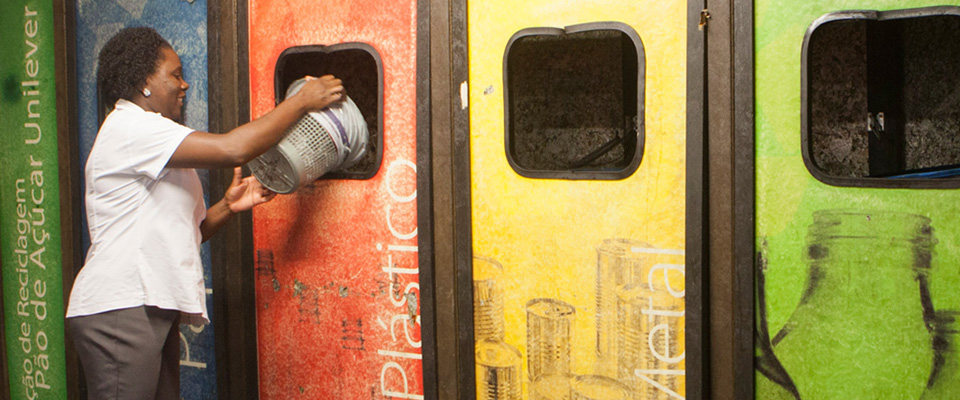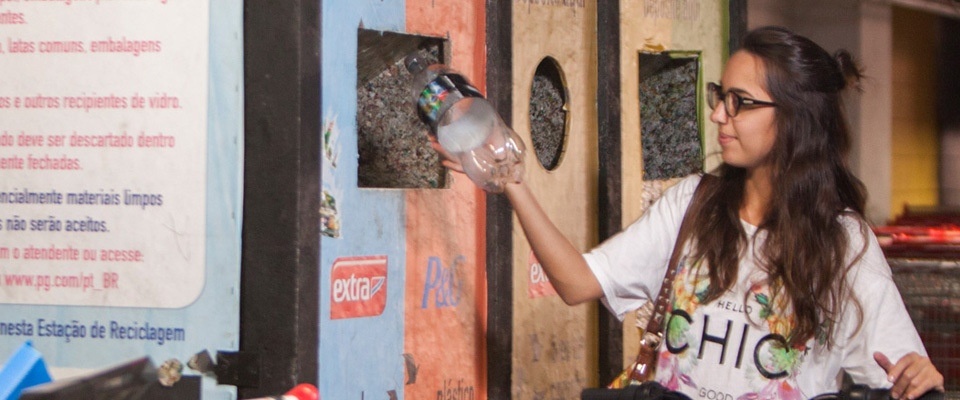A Focus on Sustainability
Conscientious Consumption and Supply
A Focus on Sustainability
Conscientious Consumption and Supply
Conscientious Consumption and Supply
One of the pillars of GPA’s sustainability strategy is to encourage conscientious consumption and supply. This positioning translates into complying with all sanitation law, encouraging conscientious consumption and implementing and disseminating the guidelines from the National Policy on Solid Wastes (Política Nacional de Resíduos Sólidos -PNRS).
At Multivarejo, following the establishment of the corporate sustainability guidelines, three fronts were opened: healthy, natural and organic products; trackability of products; and education for sustainability. Based on a diagnosis, the Group set goals for 2014 that include increased marketing of organic products; developing healthier and more natural products in exclusive brands; initiatives to track products; and ensuring effective periodic communications on conscientious consumption.
In 2013, the main actions toward sustainability were also focused on waste management. The stores function as points to dispose of paper, plastic, aluminum, glass, cooking oil, batteries, cell phones, expired or out-of-use medications and pre-consumption packaging. These programs have demonstrated significant growth, showing the effect of adhering to small sustainable actions in consumers’ daily lives. But the challenge remains to engage consumers further, and thus efforts toward effective communications and consumer engagement in existing initiatives will be developed in 2014.
The Akatu Partnership
Through a partnership with the Instituto Akatu, an NGO that works to raise consciousness and mobilize society on conscientious consumption, pointers are publicized from time to time for consumers at Extra and Pão de Açúcar. This shows how it is possible to inject sustainability into the communications planning for the brands, raising consciousness on conscientious consumption on an ongoing basis.
Pão de Açúcar produces Flavors of the Week magazine, which includes tips on sustainable consumption, recycling and how to use water, energy and other resources conscientiously. Extra supplies insights through the sound systems at the stores, pamphlets, and the social networks.
National Policy on Solid Wastes <SO5>
GPA’s socio-environmental programs are in harmony with the National Policy on Solid Wastes, which posits that all those that participate in the chain of production (manufacturers, importers, distributors, marketers and citizens) are responsible for the correct disposal of packaging and post-consumption materials.
Through the Ministry of the Environment’s competitiveness group, GPA has participated in discussions relating to the PNRS.
Through the Associação Brasileira de Supermercados, the Instituto para Desenvolvimento do Varejo and the Compromisso Empresarial para Reciclagem, the Company remains active in technical working groups created to debate topics proposed under the National Policy on Solid Wastes. At bimonthly meetings, these working groups have been discussing sectoral agreements, to be presented to the Ministry for the Environment, in five areas: packaging, durable household goods, lighting, batteries and medications.
Although these debates are still taking shape in Brazil, GPA already has real examples of how it has increasingly expanded the number of actions that are in accord with the PNRS, to make good on its commitment to society and the environment, as is the case in the reverse logistics in its operations and other initiatives like:
RECYCLING OF LIGHT BULBS
A Pão de Açúcar store located on Av. Cerro Corá in São Paulo collects light bulbs from customers and disposes of them correctly. In 2013, 4,182 intact light bulbs and 30 kilos broken light bulbs were collected.
ELECTRONIC TRASH
This initiative, in effect since 2011 in partnership with the Associação Brasileira de Empresas de Limpeza Pública (ABRELPE), encourages the correct disposal of electronics, one of the cornerstones of the PNRS. Collection sites were installed at four Extra stores and one Pão de Açúcar store, where customers can take microwaves, printers, televisions, computers and other items. In 2013, 3.8 metric tons of equipment was collected.
BATTERY COLLECTION
The project, developed in conjunction with the Associação Brasileira da Indústria Elétrica and Eletrônica (ABINEE), collects batteries from consumers in Pão de Açúcar, Extra Hipermercado, Extra Supermercado, Minimercado Extra, Assaí, Pontofrio and Casas Bahia stores. In 2013, 7,993.2 kilos of batteries were disposed of correctly.
HELLO RECYCLE
Instituted in 2010 in partnership with Nokia do Brasil, the program provides reverse logistics for cell phones, batteries and accessories. All collected material is sent for recycling, and may be reutilized, for example, for making toys, electronic devices or dental products. In 2013, 2,380 kilos of materials were collected.
PROPER DISPOSAL OF MEDICATIONS
Maintained since 2010 in partnership with Laboratórios Eurofarma, the initiative seeks to raise consumer consciousness on the importance of proper disposal of expired or out-of-use medications and sharp articles like needles and ampoules. This material is collected at 27 Extra stores and four Pão de Açúcar stores. In 2013, 6,430 kilos of medications were collected.
GREEN BOX
The program, initiated in 2008, encourages pre-consumption disposal of packaging, to raise consumer consciousness on proper waste disposal. Toward this end, all Pão de Açúcar stores have bins so that product packaging can be discarded instead of being taken home. All collected material is donated to recycling cooperatives that partner with the Group. In 2013, 1,328,722 pieces of packaging were donated. In 2013, the initiative had a strong campaign with the comedian Clarisse Falcão. The video had more than 2.8 million hits on YouTube, resulting in a 25% increase in the volume collected, as compared to the year prior.
ECOAMPLA
The project, inaugurated in 2012 by Assaí in Alcântara in Rio de Janeiro state, encourages the disposal of recyclable materials delivered voluntarily by consumers in exchange for a discount on their electricity bill. In 2013, 170,827 kilos were collected.
FRIENDS OF THE PLANET
Via Varejo’s recycling and reverse logistics program at its units and 200 stores. The initiative involves the collection, segregation and recycling of packaging and products sold. Since inception in 2008, through December of 2013, more than 60,000 metric tons of materials have been recycled. In 2013 alone, there were 11,000 metric tons of materials.
Recycling Stations
GPA was the first retail company in Brazil to offer its consumers the opportunity to voluntarily deliver recyclable materials to store parking lots. Currently, more than 253 of the Group’s stores offer this option to consumers. Since inception in 2001, the program has collected and steered more than 35,000 metric tons of recyclable materials to partnering cooperatives.
Recycle More, Pay Less <SO1>
In May of 2013, Assaí signed a partnership with AES Eletropaulo to create the "Recycle More, Pay Less" program, which consists of trading in recyclable materials for discounts on electricity bills. Materials are collected at the Guaianases store in São Paulo. During the year, 144 consumers registered and donated 3,746.36 kilos of materials to a cooperative. For 2014, the objective is to add another two collection sites at new Assaí stores.





